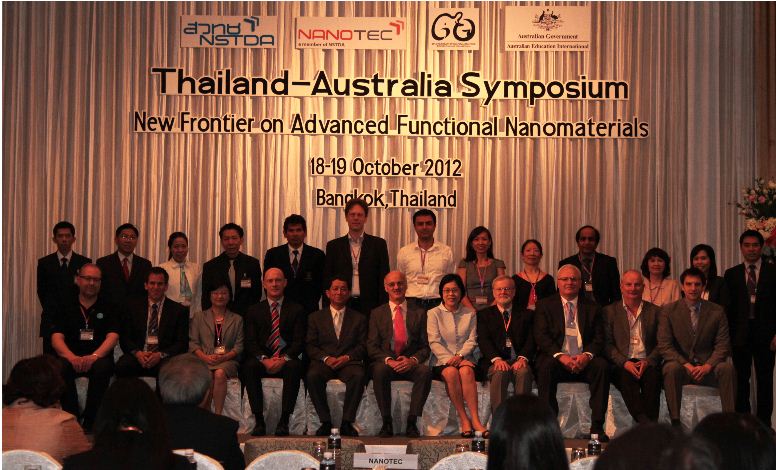Thailand and Australia taking a new frontier in scientific research collaboration

Australian Ambassador to Thailand, HE Mr James Wise (middle, front row); Executive Director of NANOTEC, Professor Sirirurg Songsivilai (fifth from left, front row); Education Counsellor of the Australian Education International, Mr Scott Evans (fourth from left, front row); and representatives from Australian and Thai universities and research institutes.
Australian Education International at the Australian Embassy in Bangkok, in cooperation with Thailand’s National Nanotechnology Center (NANOTEC) recently hosted the Thailand-Australia Symposium: New Frontier on Advanced Functional Nanomaterials at the InterContinental Hotel, Bangkok. The event was organised as part of the celebrations marking the 60th anniversary of Australia-Thailand bilateral relations.
The Australian Ambassador to Thailand HE Mr James Wise and Executive Director of NANOTEC Professor Sirirurg Sonsivilai presided over the opening ceremony.
“The aim of this Thailand-Australia Symposium is to bring together leading Thai and Australian researchers and scientists to exchange research ideas, knowledge and, at the same time, identify opportunities for research collaborations among peers,” said Professor Sirirurg Songsivilai in her remarks.
“Australia and Thailand’s collaborative research relationship is underpinned by the 2004 Agreement on Bilateral Cooperation between the Government of the Kingdom of Thailand and the Government of Australia. In 2010, Australia was Thailand’s fourth most frequent collaborative partner participating in 4.6% of Thailand’s international joint publications. We hope this collaborative connection will grow much stronger,” said Ambassador Wise.
The Symposium focused on areas related to Nanomaterials for Sensing and Electronic Devices, Nanomaterials for Energy and Environment and Nanocharacterisation and Analysis. Representatives and researchers from seven Australian leading technology and research universities including the University of Technology, Sydney; the University of Queensland; University of South Australia, as well as Australia’s Commonwealth Scientific and Industrial Research Organisation (CSIRO) participated in the Symposium alongside their Thai counterparts from Chulalongkorn University, Mahidol University, King Mongkut’s University of Technology Thonburi, Suranaree University of Technology, King Mongkut’s Institute of Technology Ladkrabang, and NANOTEC.
